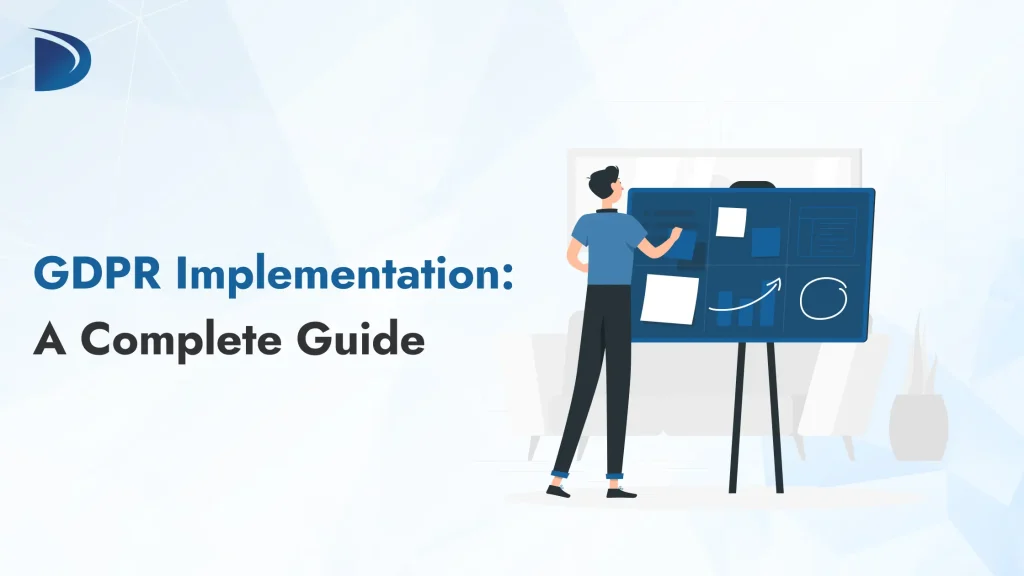Table of Contents
The General Data Protection Regulation (GDPR) is a European Union (EU) law designed to enhance data privacy and security for individuals within the EU. It applies to any business that processes or collects data from EU citizens, regardless of location. GDPR Implementation ensures compliance with strict data protection standards, avoiding hefty fines and building trust with customers.
In this guide, we’ll walk you through the steps, requirements, and best practices for successful GDPR implementation.
“💡 GDPR is a step forward in protecting the fundamental right to privacy.” – European Commission
What is GDPR?
GDPR is a legal framework that came into effect on May 25, 2018, replacing the Data Protection Directive 95/46/EC. It introduces stricter data protection measures, requiring businesses to handle personal data responsibly.
Key Objectives of GDPR:
- Give individuals more control over their personal data.
- Ensure transparency in how businesses collect, process, and store data.
- Standardize data protection laws across the EU.
- Impose strict penalties for non-compliance.
Who Needs to Comply with GDPR?
GDPR applies to any organization worldwide that:
- Offers goods or services to individuals in the EU.
- Monitors the behavior of EU citizens (e.g., via website tracking).
- Processes personal data of EU residents.
Failure to comply can result in fines of up to €20 million or 4% of global annual revenue, whichever is higher.
Steps to Implement GDPR Compliance
1. Understand the Data You Process
- Conduct a data audit to identify what personal data you collect, process, and store.
- Categorize data by type (names, emails, IP addresses, payment details, etc.).
- Determine where data is stored and who has access to it.
2. Appoint a Data Protection Officer (DPO)
- Required for organizations processing large-scale personal data.
- The DPO oversees GDPR compliance and data protection policies.
3. Update Privacy Policies & Notices
- Clearly inform users about data collection, usage, and rights.
- Ensure policies are concise, transparent, and written in plain language.
4. Obtain Clear and Explicit Consent
- No pre-checked boxes; users must actively opt-in.
- Provide easy withdrawal of consent.
- Document all consent records.
5. Implement Data Security Measures
- Encrypt sensitive data.
- Use multi-factor authentication (MFA) for data access.
- Regularly test security systems to prevent breaches.
6. Enable Data Subject Rights
GDPR grants individuals several rights:
| Right | Description |
|---|---|
| Right to Access | Individuals can request their data details. |
| Right to Erasure | Also known as “Right to be Forgotten.” |
| Right to Rectification | Users can request corrections to inaccurate data. |
| Right to Data Portability | Users can transfer their data to another provider. |
| Right to Object | Users can refuse certain types of data processing. |
7. Develop a Data Breach Response Plan
- Report serious breaches within 72 hours to authorities.
- Notify affected individuals if data exposure poses a high risk.
- Maintain records of all data breaches.
8. Review Vendor & Third-Party Contracts
- Ensure third-party processors (e.g., cloud providers, SaaS tools) comply with GDPR.
- Update contracts to include data protection clauses.
9. Conduct Regular GDPR Training
- Educate employees about data protection principles.
- Ensure staff understands how to handle personal data securely.
10. Perform Ongoing GDPR Compliance Audits
- Regularly review data protection policies.
- Monitor data access logs and risk assessments.
- Stay updated on GDPR amendments and best practices.
Challenges in GDPR Implementation
Common Issues Businesses Face:
- Complexity in understanding data processing activities.
- Managing user data access and deletion requests efficiently.
- Adapting legacy systems to comply with GDPR security requirements.
- Balancing data protection and business operations.
Benefits of GDPR Compliance
- Avoids Hefty Fines: Non-compliance can lead to significant financial penalties.
- Enhances Customer Trust: Users feel more secure when their data is handled properly.
- Improves Data Management: Encourages better security, storage, and processing strategies.
- Provides Competitive Advantage: Compliance makes businesses more appealing to EU-based customers.
“💡 Privacy is not something that I’m merely entitled to, it’s an absolute prerequisite.” – Marlon Brando
Tips for Effective GDPR Implementation
- Start with a Data Audit: Identify what personal data you collect, store, and process.
- Train Your Team: Educate employees about GDPR compliance and best practices.
- Obtain Clear Consent: Ensure users explicitly agree to data collection and processing.
- Update Privacy Policies: Clearly explain how user data is handled and protected.
- Implement Data Security Measures: Encrypt sensitive data and ensure secure storage.
- Enable Data Subject Rights: Allow users to access, modify, and delete their data easily.
- Appoint a Data Protection Officer (DPO): If required, assign a DPO to oversee compliance.
- Have a Data Breach Response Plan: Be prepared to notify authorities and affected individuals promptly.
GDPR Implementation Checklist
✅ Conduct Data Mapping and Audits.
✅ Appoint a Data Protection Officer (if required).
✅ Update Privacy Policies & Notices.
✅ Obtain Clear and Explicit User Consent.
✅ Implement Strong Data Security Measures.
✅ Establish a Data Breach Response Plan.
✅ Train Employees on GDPR Requirements.
✅ Review and Update Third-Party Contracts.
✅ Enable Data Subject Rights Compliance.
✅ Perform Regular GDPR Compliance Audits.
Conclusion
GDPR implementation requires careful planning, continuous monitoring, and company-wide efforts to protect user data. Following the right steps, security measures, and legal requirements can help organizations avoid penalties and build trust with their customers.

